National Awards recognise exceptional service in Cyclone Gabrielle response
30 January 2024
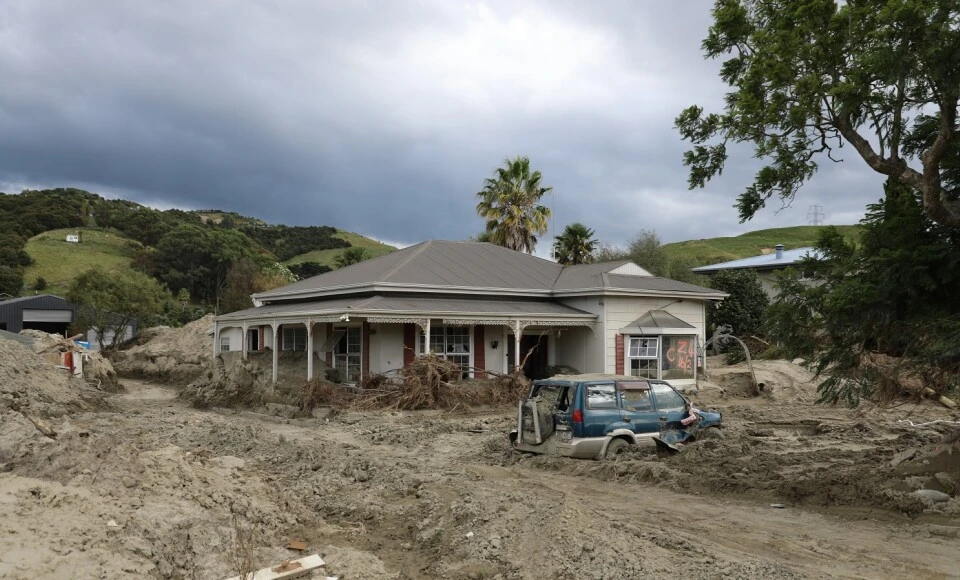
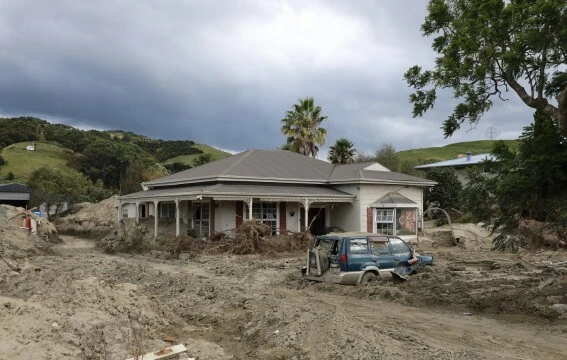
It’s pretty hard to mobilise the power of humanity without human beings. That’s why every year we recognise the service of our people through national honours and awards. We’re a team of over 500 employees and 9,000 members and volunteers across the motu from Kaitaia to Invercargill.
From service awards ranging from 40 to 60 years of service, to certificates of commendation and appreciation, our national honours and awards see Red Cross people from all walks of life recognised for their service to our Movement. In 2023, over 100 people across the motu were recognised for their service to Red Cross. This story highlights a few who did extraordinary things during and after Cyclones Hale and Gabrielle.
Meritorious Service Award recipient
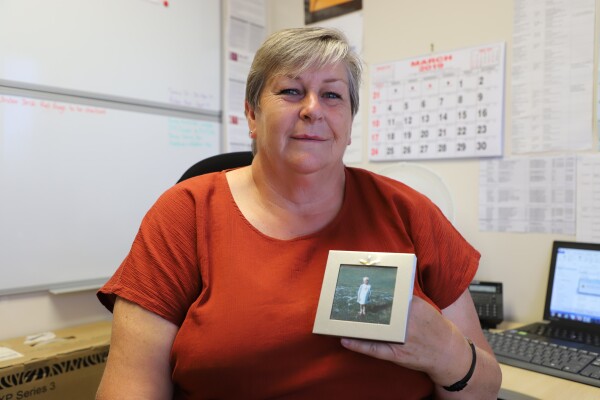
Carol Ball with a photo of her younger self dressed as a Red Cross nurse
Carol Ball has been with us for 33 years and is based in Christchurch. Eight weeks after Cyclone Gabrielle hit, she volunteered to deploy to Hawke’s Bay. We needed a project manager for the response and from the moment she arrived she was “in there – boots ‘n’ all.”
“When we drove through the little town of Pakowhai, that was where were we first saw the devastation, it was two months on but there were still huge piles of silt and debris along the road, damaged vehicles scattered around, houses that were still full of silt, it was pretty confronting,” she said.
In her role, Carol travelled all over the area meeting with people, delivering generators and clean up kits, as well as coordinating the Red Cross response in a region still reeling from the devastation brought by the cyclone.
“The emotion is right there. The best thing we can do is listen – they want people to know their story and what they went through.”
National Certificate of Appreciation recipients
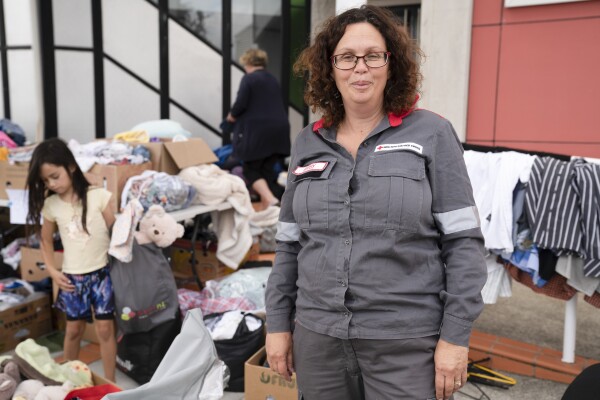
Gpysy Chant at the Napier Civil Defence Centre
Gypsy Chant is a long-serving Whanganui Disaster Welfare and Support Team volunteer. After Cyclone Gabrielle hit, she and her team deployed to Napier to help set up and run a Civil Defence Centre.
“We were nervous about the drive up because they just said ‘you’re going in blind, there’s no comms, we don’t know what the road sites are like,’” she said.
“It was just the unknown that felt scary. And so that made us realise how scared people must have been. If we were scared driving in, how scary it was for people to experience and live through it.”
Once at the Civil Defence Centre, Gypsy and the team set up beds, portacots, and everything else needed to help people who had to evacuate. This included providing psychological first aid, which helps people process their experiences.
"I love it, that’s why I do it. I've done it since 2009. Just the reward of helping. People are always so shocked because they think that we're being paid, and they say 'you must be getting overtime!' Well actually, I'm a teacher. Normally I'd be at work and my work support me to be here."
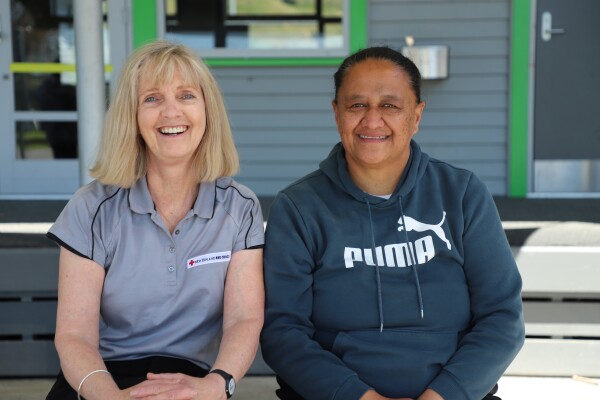
Sarah Gribbin with Pimia Wehi
Sarah Gribbin is a Psychological Advisor and has deployed in the aftermath of disasters in Aotearoa for many years. Based in Christchurch, this year she’s deployed to Auckland, Northland, Hawke’s Bay, and Te Tairāwhiti. She provided psychological first aid to affected people immediately after Cyclones Hale and Gabrielle, and also trained people to be able to do this after future disasters.
“Our job is to provide a safe and supportive place for people who are in distress. Adrenaline helps you get through the first few hours of an emergency. But it doesn’t last long, and that’s when you start to feel exhausted and overwhelmed. This is where we come in and where psychological first aid is so important.”
Since Cyclones Hale and Gabrielle, Sarah and our small team of psychological advisors have trained over 1,000 people in psychological first aid.
“There was huge need for psychosocial support, because people were living their own experience, but also having to support and look after others around them in their whānau and their social networks,” said Ali Souch, our Team Leader for Psychosocial Training.
The sessions help communities not only adapt, cope, and recover from these disasters, but also build skills for mental and emotional resilience in the future.
“We know that there will unfortunately be more disasters in New Zealand. The more people we can train in psychological first aid, the more resilient communities will be if the worst happens again,” Sarah said.
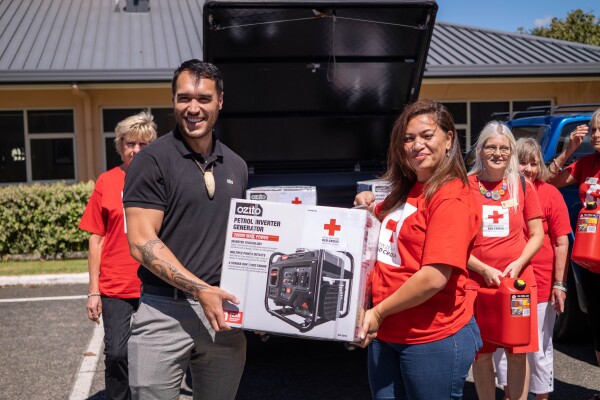
Far North Mayor Moko Tepania and Nancy Kareroa-Yorke
When Far North Mayor Moko Tepania appeared on national television after appealing for generators after Cyclone Gabrielle, Nancy Kareroa-Yorke heard the call.
At the time she was our Northland Area Council Chair. She worked with Red Cross House in Wellington and local Red Cross members to deliver 30 generators to Far North District Council. The generators were dispersed across the region to Civil Defence Centres to be used after Cyclone Gabrielle and in future emergencies.
“New Zealand Red Cross has always been about helping vulnerable people and mobilising the power of humanity and enhancing community resilience. I’m always happy to be part of the Red Cross work,” she said.
"The thing that got me hooked into Red Cross was making people happy and when you're doing something good, you want to keep doing more and so this work grew from there."
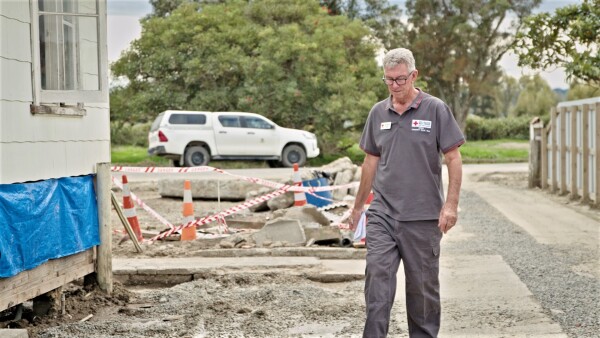
Phil Parker in Wairoa
A week after Cyclone Gabrielle devastated parts of Te Tairāwhiti, Phil Parker left his home in Katikati and drove five and a half hours to help in the flooded town of Wairoa.
“I think this is the biggest weather-related event I’ve ever seen and I’ve been in a lot of events. I don’t think people quite understand how many people have been affected and what the effect is. It’s been a real eye opener to see the devastation of the land and what people have had to go through.”
As our regional project manager for Tarāwhiti and Wairoa, he and his Red Cross ute have become well-known in communities large and small across the East Cape.
“It’s been my role to visit affected communities, find out what’s needed, and help people to access the support New Zealand Red Cross can offer.” This has ranged from supplying clean up kits or organizing psychological first aid training, to helping organisations apply for grants from the New Zealand Disaster Fund.
“Emergency management is what I do — it’s my passion. Working here has been like icing on the cake for me because I am dealing with the community all the time, we’ve provided a lot of grant funding here but even just the little bits and pieces we’re doing too – I can see that it’s been a huge help for people.”
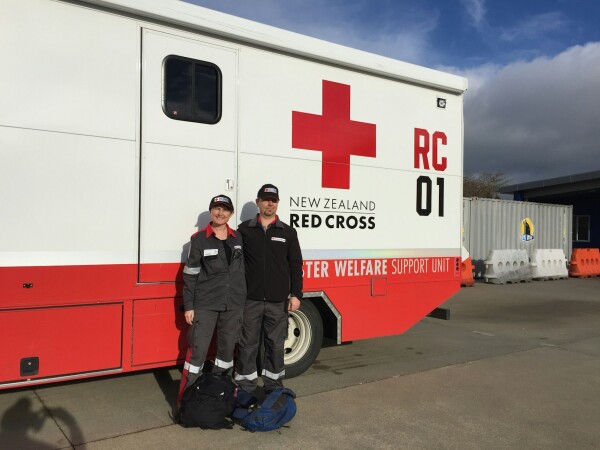
Tiffany and Stuart Whelan
On 27 January, Stuart and Tiffany Whelan were at Auckland Airport ready for a 6pm flight. Then, the airport began to flood. They’re both experienced disaster welfare and support volunteers, so they knew that the situation was getting serious.
“We could see how things were going – it seemed as though it could be serious,” said Stuart.
They went straight to the Disaster Welfare and Support Team warehouse to check that vehicles had pumped tyres, and that stretchers and blankets were packed for when the call to deploy was bound to come. At midnight, the call came.
Stuart, Tiffany, and other members of our Disaster Welfare and Support Teams spent the next week supporting people at Civil Defence Centres across Auckland, sleeping in shifts at the team warehouse.
“We provide vital shelter for those who’ve been forced to leave their homes. We help people reconnect with family and loved ones, we give people advice and support on how to access household goods and services,” said Stuart.
More information
Thank you to all our people for your contributions to our mission and Movement – we couldn’t do it without you.
- View all the 2023 recipients and see what awards you can nominate people for.
Honours and awards - If you want to get involved in our work, join us! We have over 40 branches across the motu and volunteer roles to suit everyone.
Join New Zealand Red Cross
Find a volunteer role
